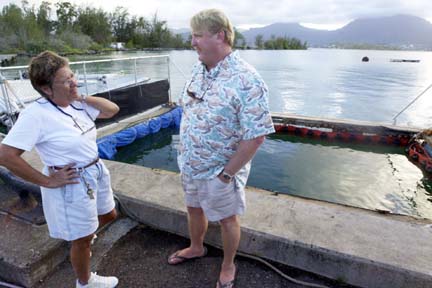
RICHARD WALKER / RWALKER@STARBULLETIN.COM
Marlee Breese, left, vice president of Hawaiian Islands Stranding Response Group, and Dr. Robert Braun talked yesterday in front of the pen where a second melon-headed whale was euthanized in Kaneohe.
Second whale dies
a month after
its rescueThe stranded mammal
was euthanized after
its health deteriorated
The second of two melon-headed whales that beached themselves off Hauula last month died yesterday at Marine Corps Base Hawaii in Kaneohe.
The whale, dubbed No. 1, was euthanized about noon. The whale's condition worsened Monday morning, and he was in a lot of pain and had lost his appetite, according to Dr. Robert Braun, a volunteer veterinarian.
An autopsy revealed the animal was suffering from severe pancreatitis, a painful condition in which the pancreas tries to digest itself, said Braun, president of the Hawaiian Islands Stranding Response Group.
"In my opinion, it was something the animal couldn't recover from," he said.
The two whales, both 7-foot males weighing more than 360 pounds each, appeared to be "close to geriatric," with their teeth worn down, Braun said.
The whales beached themselves Aug. 19 at Hauula Beach Park. They were diagnosed with food poisoning and were transported to the Marine base, where they received 24-hour care from volunteers.
"It's sad," said Marlee Breese, vice president of the response group, who was among those who cared for the animal. "I would have never guessed he would have made it a month." After surviving two weeks, Breese said she became optimistic No. 1 would survive.
"He was a stalwart soul," she said.
Braun said it required three people a day to look after the whales.
The other whale, called No. 2, died five days after the stranding. It had a longstanding heart condition and died of congestive heart failure, Braun said.
Melon-headed whales are common around the Hawaiian Islands, but are usually found in pods of 200 to 400 animals at least 20 miles off shore.
Because they are extremely elusive and swim away from boats, little is known about them, Braun said.
Breese said in the 1970s, scientists caught some melon-headed whales in Hawaii and kept them in captivity for study. "They're strange rangers," she said, because their behavior and the sounds they make are "never heard from any other species."
